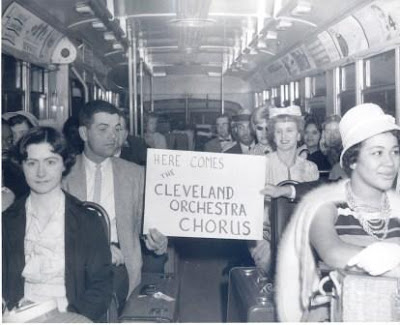The Cleveland Orchestra plays Mozart and Strauss
On Sunday afternoon, the orchestra offered the same program it will take to Vienna's historic Musikverein as part of a two-night residency in the capital of the conductor's home country. The program pairs Richard Strauss' mournful Metamorphosen with the Great Mass in c minor, a lesser-known, unfinished work by Wolfgang Amadeus Mozart.
Metamorphosen is one of Richard Strauss' last works, a funereal piece written in 1944 for 23 solo strings. In the course of a 25-minute-span, Strauss looks back on the glories of Western music and realizes he is standing at the end of his art form. The music quotes and references 200 years of German music, from Mozart and Beethoven to Strauss himself. The subject matter: the death of German musical culture under the Nazi boot, and the destruction of famous music venues in Dresden and Vienna under the Allied assault in World War II.
Despite the serious nature of the subject matter, Metamorphosen ebbs and flows with Strauss' characteristic, long melodic lines. The Cleveland string players captured the autumnal glow that illuminates the score, the blend of small ensembles and solo melodic lines that weave together to create a dense, and ultimately soothing blanket of sound.
Part of the legend surrounding Mozart includes his Requiem, unfinished at the time of his death. No such drama surrounds the Great Mass--Mozart simply didn't finish the piece. But in this performing edition, assembled by musicologist H. Robbins Landon, Mr. Welser-Möst made a good case for this lesser-known work.
He was reinforced by an able cast of singers, led by sopranos Malin Hartelius and Julia Lezhneva--the latter heard recently at this summer's Mostly Mozart Festival. Joined by tenor Martin MutterRutzner and bass Ruben Drole. the singers delivered the sacred text with warmth and devotion to Mozart's melodic lines.
The glory of this performance was the Cleveland Orchestra Chorus, under the direction of Robert Porco. The choristers made each movement of the Grosse Messe a powerful declaration of faith, not just in the religious subject matter but in the power of Mozart's music. Even in its torso state, this Mass is a raw gem. Here, it was polished with smooth precision under Mr. Welser-Möst's expert direction.
On Sunday afternoon, the orchestra offered the same program it will take to Vienna's historic Musikverein as part of a two-night residency in the capital of the conductor's home country. The program pairs Richard Strauss' mournful Metamorphosen with the Great Mass in c minor, a lesser-known, unfinished work by Wolfgang Amadeus Mozart.
Metamorphosen is one of Richard Strauss' last works, a funereal piece written in 1944 for 23 solo strings. In the course of a 25-minute-span, Strauss looks back on the glories of Western music and realizes he is standing at the end of his art form. The music quotes and references 200 years of German music, from Mozart and Beethoven to Strauss himself. The subject matter: the death of German musical culture under the Nazi boot, and the destruction of famous music venues in Dresden and Vienna under the Allied assault in World War II.
Despite the serious nature of the subject matter, Metamorphosen ebbs and flows with Strauss' characteristic, long melodic lines. The Cleveland string players captured the autumnal glow that illuminates the score, the blend of small ensembles and solo melodic lines that weave together to create a dense, and ultimately soothing blanket of sound.
Part of the legend surrounding Mozart includes his Requiem, unfinished at the time of his death. No such drama surrounds the Great Mass--Mozart simply didn't finish the piece. But in this performing edition, assembled by musicologist H. Robbins Landon, Mr. Welser-Möst made a good case for this lesser-known work.
He was reinforced by an able cast of singers, led by sopranos Malin Hartelius and Julia Lezhneva--the latter heard recently at this summer's Mostly Mozart Festival. Joined by tenor Martin MutterRutzner and bass Ruben Drole. the singers delivered the sacred text with warmth and devotion to Mozart's melodic lines.
The glory of this performance was the Cleveland Orchestra Chorus, under the direction of Robert Porco. The choristers made each movement of the Grosse Messe a powerful declaration of faith, not just in the religious subject matter but in the power of Mozart's music. Even in its torso state, this Mass is a raw gem. Here, it was polished with smooth precision under Mr. Welser-Möst's expert direction.





